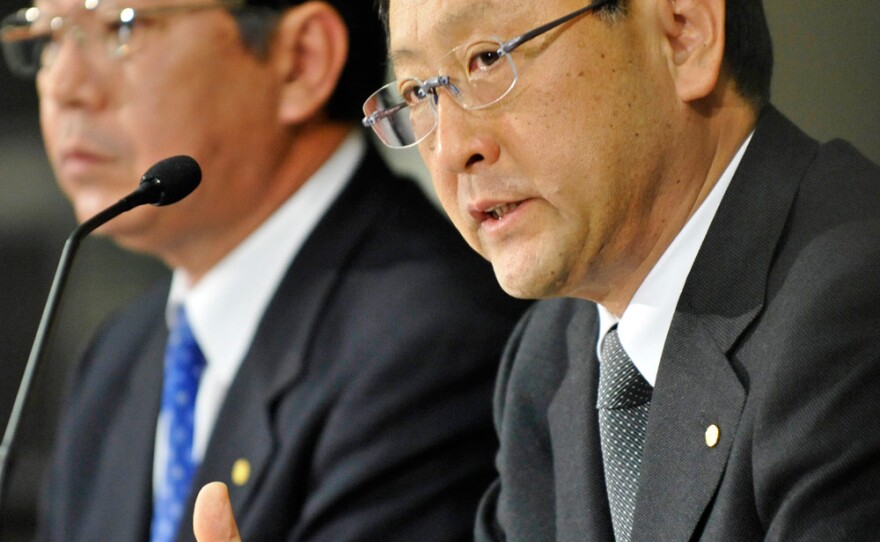It's not just Congress, regulators or consumers who are taking aim at Toyota these days. Lawyers are joining the fray, with the number of lawsuits filed against the world's largest automaker climbing daily.
Toyota has already recalled more than 8.5 million vehicles because of unintended acceleration and braking problems. Now, the company and the U.S. government are looking into steering complaints involving its popular Corolla compact.
"There's blood in the water," says Byron Stier, a professor at Southwestern Law School in Los Angeles. The former corporate defense lawyer suggests that when companies are under siege, as Toyota is now, lawyers gear up.
"What Toyota is looking at is a battle that has a variety of stages that will take place in a variety of different courts," Stier says. "They really have to be fighting on multiple fronts all at once."
Toyota will be facing at least three kinds of lawsuits, including ones on behalf of those seriously injured or killed in Toyota vehicles, class-action suits for emotional distress or the diminished value of a car, and shareholder lawsuits.
Lawsuits Over Deaths Or Serious Injuries
Roughly three dozen deaths have already been linked to alleged defects and problems in Toyota vehicles. Still, more fatal accident reports are expected over the next few weeks. Families of some of those victims have already filed suit, and many more lawsuits are expected.

Attorney Todd Walburg in the San Francisco office of Lieff Cabraser Heimann and Bernstein says lawyers have already filed actions in cases where Toyota vehicles accelerated unintentionally and couldn't be stopped. He says these are product liability suits.
"We have to prove there was a design defect or prove there was a failure to warn," Walburg says. "At this point, we are pursuing both theories."
Walburg says lawyers intend to show that Toyota knew about the sudden acceleration problem for years, but didn't warn consumers.
Walburg expects the automaker to blame the drivers, saying they hit the gas when they thought they had hit the brakes.
But Walburg says a "black box" on many of the vehicles could provide some answers. The event data recorder, he says, "stores various kinds of data about the crash speed, braking and so forth, and I think when we are able to see what happened just before the crash, I think Toyota will have a tough time explaining it wasn't caused by a defect in the vehicle."
Lawsuits For Emotional Distress, Diminished Value
University of South Carolina Law School professor David Owen, who has written textbooks on tort law, says courts have generally been unresponsive to claims regarding emotional distress or the diminished value of a car.
"Diminished value is difficult, because while Kelley Blue Book has reduced the value of a car by 3 percent, it's kind of a fictitious loss for somebody who planned to keep his Toyota anyway," Owen says. (The 3 percent reduction would amount to hundreds of dollars.)
But he says the claims of emotional distress could be problematic for Toyota. A case in point: if a young mother is anxious about having to drive her kids to school in a car that might not be safe. "Now whether that's worth $100, $1,000 or $10,000 is a big question," Owen says.
Shareholder Lawsuits
Attorney Darren Robbins in the San Diego office of Coughlin Stoia Geller Rudman and Robbins says investors lost hundreds of millions of dollars because they relied on statements made by Toyota that turned out to be false and misleading. For example, Toyota said last year that floor mats — as opposed to something more complicated — were the cause of unintended acceleration.
"Juries understand lies," Robbins says. "It boils down to a very simple concept. We believe the objective evidence will show that when these representations were made, they were made at a minimum with a reckless disregard for the truth, and in some cases an intent to mislead investors."
Toyota's Response
Asked about the charges being made in various lawsuits, a spokesman for Toyota says that, as a matter of policy, the company doesn't comment on pending litigation.
Stier, the professor at Southwestern Law School, used to defend major corporations. He suggests that Toyota's legal predicament is particularly challenging because whatever it says or does to address safety concerns or mollify consumers or regulators could be turned on its head and used against the company in court.
The question Toyota may have to consider is whether any public comment amounts to "an admission of responsibility, of negligence [or] of some kind of defect in their car," Stier says.
The legal bills, along with compensation for any damages, will be costly to the automaker. Earlier this month, Toyota said costs related to the massive recalls could total about $2 billion. Some experts believe the lawsuits could cost Toyota even more.
Copyright 2022 NPR. To see more, visit https://www.npr.org. 9(MDAzMjM2NDYzMDEyMzc1Njk5NjAxNzY3OQ001))






